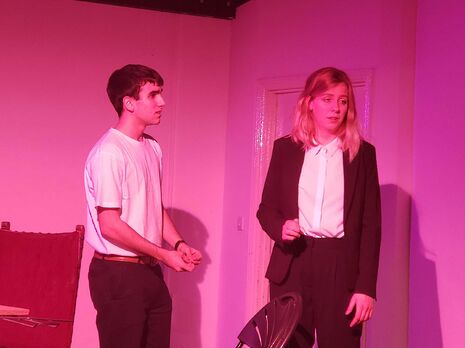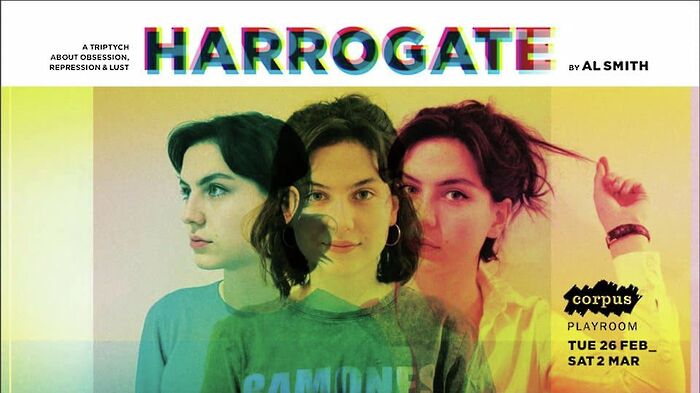Panoptikos preview
The audience is being watched in Corpus’ fresher’s play where the act of watching is explored in panopticon style

Panoptikos is made up of two Greek words: pan and optikos - meaning the all-seeing eye: as the play opens, the all-seeing eye traverses in the Corpus Playroom, both on and off the stage; the Greek element of the title shines through the play, while the title’s lexical resemblance to the panopticon rings a bell as the play unravels its uncanny resemblance to a reality show.
"This way, the audience is no longer a comfortable observant, but is placed in the same spot as the characters in the play, participating in their game of watching and being watched"
The play displays the rapid disintegration of Ava’s (Amy Heffernan) life upon the death of a patient of hers, Charlie (Pablo Cano Carciofa), who has a scandalous link to her private life. Everything, from her picture-perfect family to her immensely successful career, is slowly shredded into tatters when Ava realises that her involvement in the investigation in Charlie’s death is more than providing his medical history. From there on, the audience, and everyone else in her life charts her downfall with a hawk’s eye, scrutinising every bit of her action in search of clues to piece together what has happened behind the placid facade of success.
Tensions emerge as the impact of the death ripples further into Ava’s life - the billowing cold fury, friction with her daughter’s increasing rebelliousness, the overhanging stress from the surrounding gossip, and the inspector’s sharp accusations - all of them criss-cross and coalesce into an overarching, omnipresent fog of paranoia, under which Ava struggles to reconcile her professional facade with her loss of control over the prying eyes and outstretched claws pawing into her life, and finally loses her grip on rationality. The tension on motherhood stood out particularly as Ava’s obliviousness about her lack of participation in her child’s upbringing was painfully pitted against her emotional weakness for her daughter as her daughter confronted her with a collected view of what she has done. Tension on Charlie’s side was also masterfully played out when the burden of guilt surged exponentially upon the revelation of the central position of Ava, his doctor, in his illicit affair.
Talking to director Atlanta Hatch and assistant director Lottie Reeder, who also wrote the play, it was revealed that the duo had wished to stage the Greek tragedy Medea in the playroom, but realised that it wouldn’t work. Panoptikos was a product of the continuity of the Greek tragedy theme, to “make our ideas and concepts work, and do something new”, as well as Atlanta’s fascination with the idea of watching, as mirrored in reality television, and a Hunger Games-style play, where “people [are] watching and intervening, and kind of just participating in the tragedy of someone’s life”. Elements of Greek tragedy were woven into the modern setting of the play, perhaps the protagonist Ava could be interpreted as a modern version of Medea, but ultimately there are much freedom in how the approach the play, “you can read it as a Greek tragedy, or you can be removed from it as it is pretty much in the modern day”, said Lottie. Ultimately, Atlanta and Lottie wanted to create a play that “everyone can enjoy, whether you like English or not, whether you like plays, or you don’t”, and one which is “immediately relevant and engaging for the modern audience”.
The smaller characters embody worthy side discussions to arise from the play, and uphold its resemblance to Greek tragedy. The office staff (Jennifer Bolarinwa, Michael Hare, Isabel Freedman) was essentially a Greek chorus, each with their alignment and personality, commenting on the situation with cheeky but occasionally caustic remarks without any consideration on its impacts. In director Atlanta Hatch’s words, they are the social media, or Twitter feeds that relentlessly add personal takes to current events, very often without consideration for the stakeholders’ wellbeing and lacked rigorous reasoning. Ava’s daughter Sophia (Hannah Mitchell), who was silenced but always present, served as an innocent but level-headed perspective towards the havoc when she had the chance to confront her mother at the end, while her death fitted the grand ending of Greek tragedies. Sophia’s perceptiveness reminds us of the power of a child’s mind - its ability to observe and think without the influence of social pressure - and its tendency to be undermined.
The modern setting of the play and the clear display of Ava’s downfall, in both the perspective of probing outsiders and flashback revelations from Ava’s mind, echoes the notion of reality television perfectly - the audience is sitting there like all-knowing narrator, anticipating an epic crash in Ava’s life at the end of the play while witnessing every detail. However, the significance of “watching” extends well beyond the audience’s default role in the theatre. The show is going to experiment with projection and live-streaming in the play, where actors will be live-streaming the stage and theatre on their phones to be projected on screens in the theatre throughout the play. This way, the audience is no longer a comfortable observant, but is placed in the same spot as the characters in the play, participating in their game of watching and being watched. As much as Ava is tormented by the crumbling of her life and the panoply of gossip around it, the audience will also be unsettled over the flicker of their faces on the screens, and the ubiquitousness of flashing camera lenses pointing towards them. As Atlanta said, this is to get across a sense of theatrical alienation of knowing that the play being watched is artificial, “distancing and perspective are something we played with quite a lot in the script and staging”. However, it is not a cynical sense of artificiality that they want to convey. Ultimately, it is the juxtaposition between the artificiality and realisation that the characters are real people with raw emotions that they want to go for, “yes they are put in artificial environments and prompted to do certain things but they are feeling it, and they are living through it; [...] as much as we enjoy watching all the drama, it’s really sick and twisted that we enjoy watching that”, Atlanta emphasised. The audience is not detached from the play. They are encouraged to feel for the characters as fellow humans while examining their position as a spectator in the debacle running on stage. “You’re never sure where you are in the audience, whether you are close to the story or far away, and that’s the whole point,” Lottie added. The audience is nudged to reflect on what are we looking for when we spectate other’s lives for entertainment, and whether as spectators we are truly distanced from what unfolds on stage or not.
Leading a team comprising of one fourth of Corpus’ fresher cohort, Atlanta and Lottie both found it a good learning experience which reaped unexpected successes. Atlanta said it was “liberating” to be engaging with new writing, as the script could be altered flexibly as the production went on, with insights cropping up from the cast as the production team explored the characters and the play together. For Lottie, it could be ensured that characters were portrayed realistically as the fresh cast, many of whom without prior theatre experience “have an authentic approach, they’re more happy to go in like real people”. This in turns facilitates the play’s authenticity and heightens the theatrical paradox where the audience empathises with the characters even though they are fictional.
It was a piquant experience watching the rehearsal, as the shift of narrative between scenes develops its complexity and keeps the audience on the edge of their seats as tensions layer up and revelations emerge. The characters were a delight to watch - Ava balancing her professional demeanour and mounting fragility, the inspector’s forceful and relentless scepticism, Charlie’s moral struggle and remorse, Cynthia’s judgemental edge, and more as sparks fly from characters’ interactions, Panoptikos is a phoenix that rises from its protagonist’s demise, igniting reflections on what it means to watch and kindling the lights of a modern panopticon in its theatre experience.
 News / Clare Hall spent over £500k opposing busway 24 December 2025
News / Clare Hall spent over £500k opposing busway 24 December 2025 Comment / The ‘class’ of Cambridge24 December 2025
Comment / The ‘class’ of Cambridge24 December 2025 News / Caius mourns its tree-mendous loss23 December 2025
News / Caius mourns its tree-mendous loss23 December 2025 Comment / Yes, I’m brown – but I have more important things to say22 December 2025
Comment / Yes, I’m brown – but I have more important things to say22 December 2025 News / Girton JCR publishes open letter expressing solidarity with Palestine25 December 2025
News / Girton JCR publishes open letter expressing solidarity with Palestine25 December 2025











